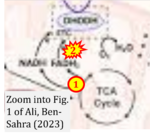Ali 2023 Trends Cell Biol
| Ali ES, Ben-Sahra I (2023) Regulation of nucleotide metabolism in cancers and immune disorders. Trends Cell Biol 33:950-66. https://doi.org/10.1016/j.tcb.2023.03.003 |
Ali ES, Ben-Sahra I (2023) Trends Cell Biol
Abstract: Nucleotides are the foundational elements of life. Proliferative cells acquire nutrients for energy production and the synthesis of macromolecules, including proteins, lipids, and nucleic acids. Nucleotides are continuously replenished through the activation of the nucleotide synthesis pathways. Despite the importance of nucleotides in cell physiology, there is still much to learn about how the purine and pyrimidine synthesis pathways are regulated in response to intracellular and exogenous signals. Over the past decade, evidence has emerged that several signaling pathways [Akt, mechanistic target of rapamycin complex I (mTORC1), RAS, TP53, and Hippo-Yes-associated protein (YAP) signaling] alter nucleotide synthesis activity and influence cell function. Here, we examine the mechanisms by which these signaling networks affect de novo nucleotide synthesis in mammalian cells. We also discuss how these molecular links can be targeted in diseases such as cancers and immune disorders.
• Bioblast editor: Gnaiger E
Correction: FADH2 and Complex II
- FADH2 is shown as the substrate feeding electrons into Complex II (CII). This is wrong and requires correction - for details see Gnaiger (2024).
- Gnaiger E (2024) Complex II ambiguities ― FADH2 in the electron transfer system. J Biol Chem 300:105470. https://doi.org/10.1016/j.jbc.2023.105470 - »Bioblast link«
Labels: Pathology: Cancer


